|
|
|
Sort Order |
|
|
|
Items / Page
|
|
|
|
|
|
|
| Srl | Item |
| 1 |
ID:
182258
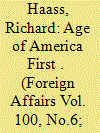

|
|
|
|
|
| Summary/Abstract |
Donald Trump was supposed to be an aberration—a U.S. president whose foreign policy marked a sharp but temporary
break from an internationalism that had de!ned seven decades ofU.S. interactions with the world. He saw little value in alliances and spurned multilateral institutions. He eagerly withdrew
from existing international agreements, such as the Paris climate accord and the 2015 Iran nuclear deal, and backed away from new ones,
such as the Trans-Paci!c Partnership (TPP). He coddled autocrats and
trained his ire on the United States’ democratic partners.
|
|
|
|
|
|
|
|
|
|
|
|
|
|
|
|
| 2 |
ID:
182261
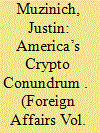

|
|
|
|
|
| Summary/Abstract |
This is the year that digital currencies went mainstream. In the
span ofjust three months last spring, China tested its "rstever digital currency in some of its largest cities, hackers
breached a major U.S. oil pipeline and successfully demanded a ransom ofmore than $4 million in Bitcoin, cryptocurrencies surged to a
record combined market capitalization ofover $2 trillion, and Jerome
Powell, the chair ofthe U.S. Federal Reserve, warned that cryptocurrencies are “highly volatile” and “may carry potential risks to . . . users
and to the broader "nancial system.”
|
|
|
|
|
|
|
|
|
|
|
|
|
|
|
|
| 3 |
ID:
182259


|
|
|
|
|
| Summary/Abstract |
For two centuries, American leaders have quarreled about how
high to place support for democracy on the list ofU.S. foreign
policy priorities. The Biden administration’s recent tragedymarred withdrawal oftroops from Afghanistan reinforced the view
ofskeptics from across the domestic political spectrum that actively
promoting democracy overseas is naive and less likely to advance the
country’s core interests than to embroil it in no-win quagmires. They
point as well to a steady decline in global freedom over the past 15
years as evidence that emphasizing democratic values is out oftouch
with prevailing trends and therefore a losing strategy, one that actually detracts from the country’s international standing. With the
United States confronted by partisan divisions at home and "erce
adversaries abroad, these critics assert that U.S. leaders can no longer
a#ord to indulge in Lincolnesque fantasies about democracy as the
last best hope on earth. They must instead shift their focus inward
and accept the world as it is.
|
|
|
|
|
|
|
|
|
|
|
|
|
|
|
|
| 4 |
ID:
182254
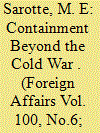

|
|
|
|
|
| Summary/Abstract |
On December 15, 1991, U.S.
Secretary ofState James Baker
arrived in Moscow amid
political chaos to meet with Russian
leader Boris Yeltsin, who was at the time
busy wresting power from his nemesis,
Soviet President Mikhail Gorbachev.
Yeltsin had recently made a shocking
announcement that he and the leaders of
Belarus and Ukraine were dismantling
the Soviet Union. Their motive was to
render Gorbachev impotent by transforming him from the head ofa massive
country into the president ofnothing.
|
|
|
|
|
|
|
|
|
|
|
|
|
|
|
|
| 5 |
ID:
182256
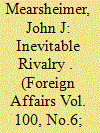

|
|
|
|
|
| Summary/Abstract |
It was a momentous choice. Three
decades ago, the Cold War ended, and
the United States had won. It was
now the sole great power on the planet.
Scanning the horizon for threats, U.S.
policymakers seemed to have little cause
for concern—and especially not about
China, a weak and impoverished country
that had been aligned with the United
States against the Soviet Union for over a
decade. But there were some ominous
signs: China had nearly *ve times as
many people as the United States, and its
leaders had embraced economic reform.
Population size and wealth are the main
building blocks ofmilitary power, so
there was a serious possibility that China
might become dramatically stronger in
the decades to come. Since a mightier
China would surely challenge the U.S.
position in Asia and possibly beyond, the
logical choice for the United States was
clear: slow China’s rise.
|
|
|
|
|
|
|
|
|
|
|
|
|
|
|
|
| 6 |
ID:
182255
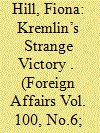

|
|
|
|
|
| Summary/Abstract |
Donald Trump wanted his July
2018 meeting in Helsinki with
his Russian counterpart, Vladimir Putin, to evoke memories ofthe
momentous encounters that took place in
the 1980s between U.S. President Ronald
Reagan and Soviet leader Mikhail
Gorbachev. Those arms control summits
had yielded the kind oficonic imagery
that Trump loved: strong, serious men
meeting in distant places to hash out the
great issues ofthe day.
|
|
|
|
|
|
|
|
|
|
|
|
|
|
|
|
| 7 |
ID:
182262


|
|
|
|
|
| Summary/Abstract |
The Biden administration came into o*ce with a clear and
unambiguous foreign policy priority: countering a rising
China. The administration’s public statements, its early national security planning documents, and its initial diplomatic forays
have all suggested that pushing back against Beijing’s growing global
in+uence will be Washington’s national security focus, alongside
transnational threats such as climate change and the COVID-19 pandemic. The question ofhow to deal with Russia, by contrast, has taken
a back seat, returning to the fore only when Russian troops amassed
on Ukraine’s border in April. That crisis served as a reminder ofthe
danger oflooking past Moscow—yet by July, President Joe Biden was
back to declaring that Russia was “sitting on top ofan economy that
has nuclear weapons and oil wells and nothing else.”
|
|
|
|
|
|
|
|
|
|
|
|
|
|
|
|
| 8 |
ID:
182253
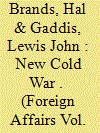

|
|
|
|
|
| Summary/Abstract |
Is the world entering a new cold
war? Our answer is yes and no. Yes
ifwe mean a protracted international rivalry, for cold wars in this sense
are as old as history itself. Some became
hot, some didn’t: no law guarantees
either outcome. No ifwe mean theCold
War, which we capitalize because it
originated and popularized the term.
That struggle took place at a particular
time (from 1945–47 to 1989–91), among
particular adversaries (the United
States, the Soviet Union, and their
respective allies), and over particular
issues (post–World War II power
balances, ideological clashes, arms
races). None ofthose issues looms as
large now, and where parallels do
exist—growing bipolarity, intensifying
polemics, sharpening distinctions
between autocracies and democracies—
the context is quite di+erent.
|
|
|
|
|
|
|
|
|
|
|
|
|
|
|
|
| 9 |
ID:
182264
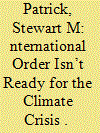

|
|
|
|
|
| Summary/Abstract |
The planet is in the throes of an environmental emergency.
Humanity’s continued addiction to fossil fuels and its voracious appetite for natural resources have led to runaway climate change, degraded vital ecosystems, and ushered in the slow death
ofthe world’s oceans. Earth’s biosphere is breaking down. Our depredation ofthe planet has jeopardized our own survival.
|
|
|
|
|
|
|
|
|
|
|
|
|
|
|
|
| 10 |
ID:
182263


|
|
|
|
|
| Summary/Abstract |
The ignominious end to the U.S. war in Afghanistan dramatically underscored the complexity and volatility ofthe broader
Middle East. Americans may try to console themselves that at
last they can turn their backs on this troubled region since the United
States is now energy self-su"cient and thus much less dependent on
Middle Eastern oil. Washington has learned the hard way not to attempt to remake the region in the United States’ image. And ifAmerican leaders are tempted to make war there again, they are likely to #nd
little public support.
|
|
|
|
|
|
|
|
|
|
|
|
|
|
|
|
| 11 |
ID:
182257


|
|
|
|
|
| Summary/Abstract |
The story ofTaiwan is one ofresilience—ofa country upholding democratic, progressive values while facing a constant
challenge to its existence. Our success is a testament to what
a determined practitioner ofdemocracy, characterized by good governance and transparency, can achieve.
|
|
|
|
|
|
|
|
|
|
|
|
|
|
|
|
| 12 |
ID:
182260


|
|
|
|
|
| Summary/Abstract |
After rioters stormed the U.S. Capitol on January 6, some of
the United States’ most powerful institutions sprang into action to punish the leaders ofthe failed insurrection. But they
weren’t the ones you might expect. Facebook and Twitter suspended
the accounts ofPresident Donald Trump for posts praising the rioters. Amazon, Apple, and Google e,ectively banished Parler, an alternative to Twitter that Trump’s supporters had used to encourage and
coordinate the attack, by blocking its access to Web-hosting services
and app stores. Major -nancial service apps, such as PayPal and
Stripe, stopped processing payments for the Trump campaign and
for accounts that had funded travel expenses to Washington, D.C.,
for Trump’s supporters.
|
|
|
|
|
|
|
|
|
|
|
|
|
|
|
|
|
|
|
|
|